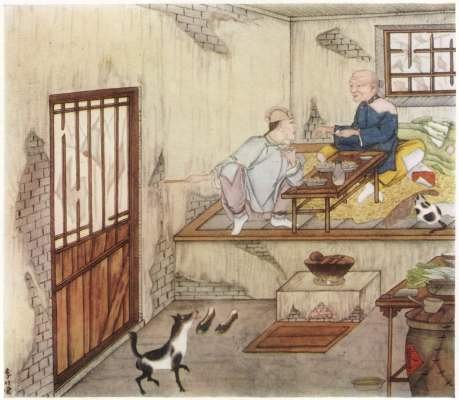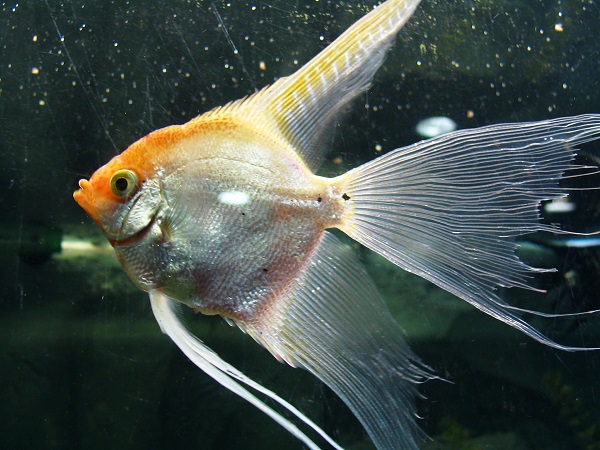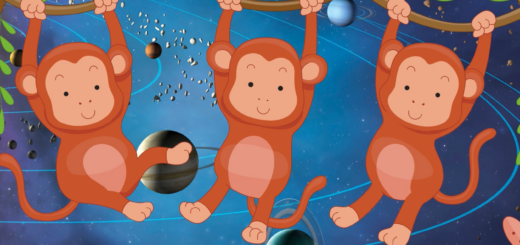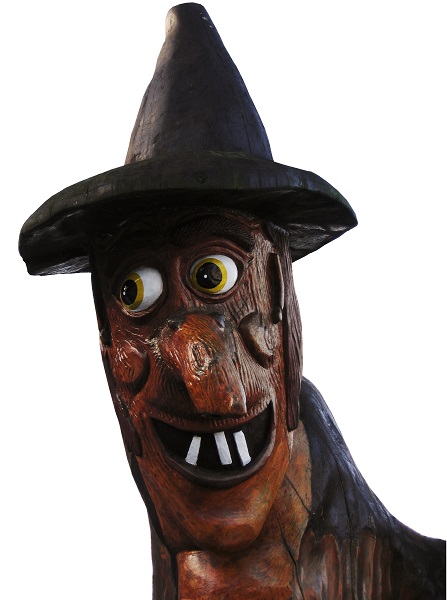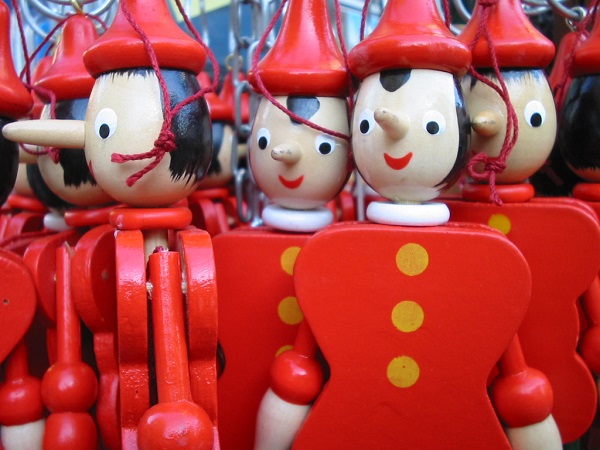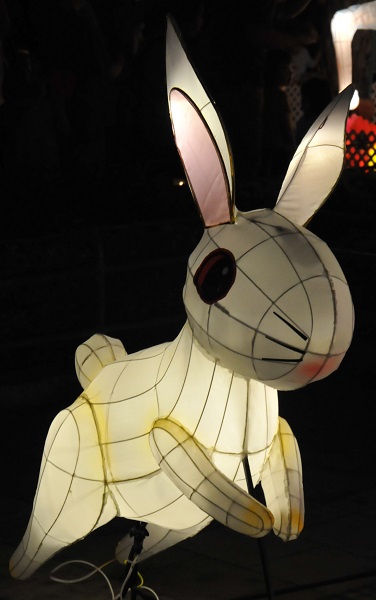The Origin of Opium (Folk-Tales of Bengal, 1912) by Rev. Lal Behari Day
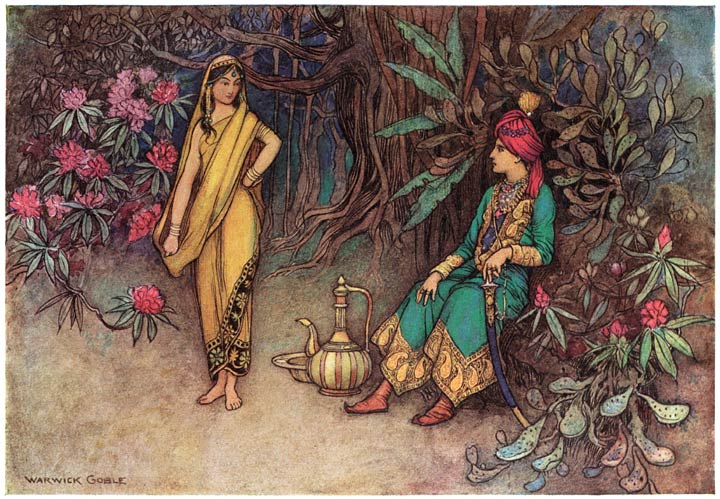
Once on a time there lived on the banks of the holy Ganga a Rishi, who spent his days and nights in the performance of religious rites and in meditation upon God. From sunrise to sunset he sat on the river bank engaged in devotion, and at night he took shelter in a hut of palm-leaves which his own hand had raised in a bush hard by. There were no men and women for miles round. In the hut, however, there was a mouse, which used to live upon the leavings of the Rishi’s supper. As it was not in the nature of the sage to hurt any living thing, our mouse never ran away from him, but, on the contrary, went to him, touched his feet, and played with him. The Rishi, partly in kindness to the little brute, and partly to have some one by to talk to at times, gave the mouse the power of speech. One night the mouse, standing on its hind-legs and joining together its fore-legs reverently, said to the Rishi, “Holy sage, you have been so kind as to give me the power to speak like men. If it will not displease your reverence, I have one more boon to ask.” “What is it?” said the Rishi. “What is it, little mousie? Say what you want.” The mouse answered—“When your reverence goes in the day to the river-side for devotion, a cat comes to the hut to catch me. And had it not been for fear of your reverence, the cat would have eaten me up long ago; and I fear it will eat me some day. My prayer is that I may be changed into a cat that I may prove a match for my foe.” The Rishi became propitious to the mouse, and threw some holy water on its body, and it was at once changed into a cat.
Some nights after, the Rishi asked his pet, “Well, little puss, how do you like your present life?” “Not much, your reverence,” answered the cat. “Why not?” demanded the sage. “Are you not strong enough to hold your own against all the cats in the world?” “Yes,” rejoined the cat. “Your reverence has made me a strong cat, able to cope with all the cats in the world. But I do not now fear cats; I have got a new foe. Whenever your reverence goes to the river-side, a pack of dogs comes to the hut, and sets up such a loud barking that I am frightened out of my life. If your reverence will not be displeased with me, I beg you to change me into a dog.” The Rishi said, “Be turned into a dog,” and the cat forthwith became a dog.
Some days passed, when one night the dog said thus to the Rishi: “I cannot thank your reverence enough for your kindness to me. I was but a poor mouse, and you not only gave me speech but turned me into a cat; and again you were kind enough to change me into a dog. As a dog, however, I suffer a great deal of trouble, I do not get enough food: my only food is the leavings of your supper, but that is not sufficient to fill the maw of such a large beast as you have made me. O how I envy those apes who jump about from tree to tree, and eat all sorts of delicious fruits! If your reverence will not get angry with me, I pray that I be changed into an ape.” The kind-hearted sage readily granted his pet’s wish, and the dog became an ape.
Our ape was at first wild with joy. He leaped from one tree to another, and sucked every luscious fruit he could find. But his joy was short-lived. Summer came on with its drought. As a monkey he found it hard to drink water out of a river or of a pool; and he saw the wild boars splashing in the water all the day long. He envied their lot, and exclaimed, “O how happy those boars are! All day their bodies are cooled and refreshed by water. I wish I were a boar.” Accordingly at night he recounted to the Rishi the troubles of the life of an ape and the pleasures of that of a boar, and begged of him to change him into a boar. The sage, whose kindness knew no bounds, complied with his pet’s request, and turned him into a wild boar. For two whole days our boar kept his body soaking wet, and on the third day, as he was splashing about in his favourite element, whom should he see but the king of the country riding on a richly caparisoned elephant. The king was out hunting, and it was only by a lucky chance that our boar escaped being bagged. He dwelt in his own mind on the dangers attending the life of a wild boar, and envied the lot of the stately elephant who was so fortunate as to carry about the king of the country on his back. He longed to be an elephant, and at night besought the Rishi to make him one.
Our elephant was roaming about in the wilderness, when he saw the king out hunting. The elephant went towards the king’s suite with the view of being caught. The king, seeing the elephant at a distance, admired it on account of its beauty, and gave orders that it should be caught and tamed. Our elephant was easily caught, and taken into the royal stables, and was soon tamed. It so chanced that the queen expressed a wish to bathe in the waters of the holy Ganga. The king, who wished to accompany his royal consort, ordered that the newly-caught elephant should be brought to him. The king and queen mounted on his back. One would suppose that the elephant had now got his wishes, as the king had mounted on his back. But no. There was a fly in the ointment. The elephant, who looked upon himself as a lordly beast, could not brook the idea that a woman, though a queen, should ride on his back. He thought himself degraded. He jumped up so violently that both the king and queen fell to the ground. The king carefully picked up the queen, took her in his arms, asked her whether she had been much hurt, wiped off the dust from her clothes with his handkerchief, and tenderly kissed her a hundred times. Our elephant, after witnessing the king’s caresses, scampered off to the woods as fast as his legs could carry him. As he ran he thought within himself thus: “After all, I see that a queen is the happiest of all creatures. Of what infinite regard is she the object! The king lifted her up, took her in his arms, made many tender inquiries, wiped off the dust from her clothes with his own royal hands, and kissed her a hundred times! O the happiness of being a queen! I must tell the Rishi to make me a queen!” So saying the elephant, after traversing the woods, went at sunset to the Rishi’s hut, and fell prostrate on the ground at the feet of the holy sage. The Rishi said, “Well, what’s the news? Why have you left the king’s stud?” “What shall I say to your reverence? You have been very kind to me; you have granted every wish of mine. I have one more boon to ask, and it will be the last. By becoming an elephant I have got only my bulk increased, but not my happiness. I see that of all creatures a queen is the happiest in the world. Do, holy father, make me a queen.” “Silly child,” answered the Rishi, “how can I make you a queen? Where can I get a kingdom for you, and a royal husband to boot? All I can do is to change you into an exquisitely beautiful girl, possessed of charms to captivate the heart of a prince, if ever the gods grant you an interview with some great prince! “Our elephant agreed to the change; and in a moment the sagacious beast was transformed into a beautiful young lady, to whom the holy sage gave the name of Postomani, or the poppy-seed lady.
Postomani lived in the Rishi’s hut, and spent her time in tending the flowers and watering the plants. One day, as she was sitting at the door of the hut during the Rishi’s absence, she saw a man dressed in a very rich garb come towards the cottage. She stood up and asked the stranger who he was, and what he had come there for. The stranger answered that he had come a-hunting in those parts, that he had been chasing in vain a deer, that he felt thirsty, and that he came to the hut of the hermit for refreshment.
Postomani. Stranger, look upon this cot as your own house. I’ll do everything I can to make you comfortable; I am only sorry we are too poor suitably to entertain, a man of your rank, for if I mistake not you are the king of this country.
The king smiled. Postomani then brought out a water-pot, and made as if she would wash the feet of her royal guest with her own hands, when the king said, “Holy maid, do not touch my feet, for I am only a Kshatriya, and you are the daughter of a holy sage.”
Postomani. Noble sir, I am not the daughter of the Rishi, neither am I a Brahmani girl; so there can be no harm in my touching your feet. Besides, you are my guest, and I am bound to wash your feet.
King. Forgive my impertinence. What caste do you belong to?
Postomani. I have heard from the sage that my parents were Kshatriyas.
King. May I ask you whether your father was a king, for your uncommon beauty and your stately demeanour show that you are a born princess.
 “‘You would adorn the palace of the mightiest sovereign’”
“‘You would adorn the palace of the mightiest sovereign’”Postomani, without answering the question, went inside the hut, brought out a tray of the most delicious fruits, and set it before the king. The king, however, would not touch the fruits till the maid had answered his questions. When pressed hard Postomani gave the following answer: “The holy sage says that my father was a king. Having been overcome in battle, he, along with my mother, fled into the woods. My poor father was eaten up by a tiger, and my mother at that time was brought to bed of me, and she closed her eyes as I opened mine. Strange to say, there was a bee-hive on the tree at the foot of which I lay; drops of honey fell into my mouth and kept alive the spark of life till the kind Rishi found me and brought me into his hut. This is the simple story of the wretched girl who now stands before the king.”
King. Call not yourself wretched. You are the loveliest and most beautiful of women. You would adorn the palace of the mightiest sovereign.
The upshot was, that the king made love to the girl and they were joined in marriage by the Rishi. Postomani was treated as the favourite queen, and the former queen was in disgrace. Postomani’s happiness, however, was short-lived. One day as she was standing by a well, she became giddy, fell into the water, and died. The Rishi then appeared before the king and said: “O king, grieve not over the past. What is fixed by fate must come to pass. The queen, who has just been drowned, was not of royal blood. She was born a mouse; I then changed her successively, according to her own wish, into a cat, a dog, an ape, a boar, an elephant, and a beautiful girl. Now that she is gone, do you again take into favour your former queen. As for my reputed daughter, through the favour of the gods I’ll make her name immortal. Let her body remain in the well; fill the well up with earth. Out of her flesh and bones will grow a tree which shall be called after her Posto, that is, the Poppy tree. From this tree will be obtained a drug called opium, which will be celebrated as a powerful medicine through all ages, and which will always be either swallowed or smoked as a wonderful narcotic to the end of time. The opium swallower or smoker will have one quality of each of the animals to which Postomani was transformed. He will be mischievous like a mouse, fond of milk like a cat, quarrelsome like a dog, filthy like an ape, savage like a boar, and high-tempered like a queen.”
Thus my story endeth,
The Natiya-thorn withereth, etc.
If you liked this story, leave me a comment down below. Join our Facebook community. And don’t forget to Subscribe!
Enjoy other folk tales from India!
